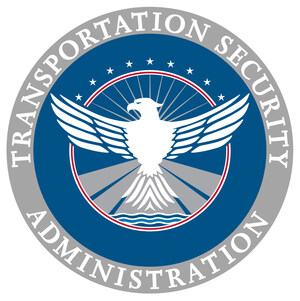2023 Year in Review: TSA highlights a year of innovation and improvements to security effectiveness, efficiency and the passenger experience
WASHINGTON, Jan. 12, 2024 /PRNewswire/ -- The Transportation Security Administration (TSA) marked another successful year in 2023, making significant strides to improve transportation security effectiveness, efficiency and enhance the aviation passenger experience. In 2023, TSA screened a record 858+ million passengers, an average of 2.4 million daily passengers at airport security checkpoints across the country. In 2023, TSA set a new record by screening 2.9 million passengers the Sunday after Thanksgiving, while seven of the ten busiest days in TSA's history took place in 2023.
"I am very proud of the work we accomplished together as an agency and with our partners in 2023, starting with the long-awaited goal of paying our employees fairly, at the same levels as their federal counterparts," said TSA Administrator David Pekoske. "At TSA, from our employees behind the scenes to those on the frontlines, we have built a culture of innovation and remain focused on staying ahead of the emerging threats. We have deployed new technology to improve security and the passenger experience, and look forward to continuing the progress this year with our incredible partners across government and industry."
In 2023, the TSA workforce:
- Screened more than 858 million passengers, averaging about 2.4 million passengers per day; 484 million checked bags and 1.9 billion carry-on items. The agency also pre-screened nearly a billion passengers through Secure Flight.
- Prevented 6,737 firearms (93% loaded) from getting into the secure areas of the airport and onboard aircraft.
- Improved cybersecurity preparedness and resilience for critical transportation infrastructure through new performance-based cybersecurity requirements for airport and aircraft operators, as the agency has done with pipeline and rail systems in previous years.
- Executed a new compensation plan for TSA employees in July 2023 with funding from the FY23 Omnibus Bill, which recognizes the critical role all TSA employees play in securing the nation's transportation systems. This plan compensates TSA employees at a level commensurate with employees of other federal agencies for the first time since the agency's founding in 2001. As a result, TSA has seen a significant reduction in attrition and improvement in the ability to recruit for open positions.
- Implemented expanded collective bargaining rights for non-supervisory Transportation Security Officers (TSOs). The FY23 Omnibus Bill also supported the implementation of a labor framework for the non-supervisory screening workforce that aligns more closely with rights of employees in other federal agencies. The spending bill also supported Merit Systems Protection Board rights for TSOs, which were first established in September 2021.
- Retained a historic 88% of frontline employees and hired more than 9,000 new TSOs and Security Support Assistants (SSA) to handle future travel volumes.
- Trained frontline employees at their new state-of-the-art TSA Academy West at Harry Reid International Airport in Las Vegas and TSA Academy East in Glynco, Ga., where the 100,000th TSO graduated in September. Our advanced facilities train and equip TSOs with the tools to succeed in one of the most agile and innovative federal agencies to remain a staple of performance.
- Continued its efforts to serve and communicate quickly, efficiently and respectfully with all travelers.
-
- AskTSA responded directly to three million traveler questions, typically within two minutes, over social media and via text to AskTSA at 275-872.
- The TSA Contact Center answered two million traveler calls and emails.
- The TSA Cares helpline provided assistance to more than 71,000 travelers with disabilities, medical conditions and other special circumstances.
- AskTSA responded directly to three million traveler questions, typically within two minutes, over social media and via text to AskTSA at 275-872.
- Grew the TSA PreCheck® Trusted Traveler Program. In 2023, more than four million people enrolled in TSA PreCheck, bringing the total number of active TSA PreCheck members to more than 18 million. Additionally:
-
- Telos became the second active TSA PreCheck enrollment provider, in addition to IDEMIA.
- Eight new airlines joined the TSA PreCheck expedited screening program.
- The agency announced that teenagers age 17 and under may accompany TSA PreCheck enrolled parents or guardians through TSA PreCheck screening lanes when traveling on the same reservation, and when the TSA PreCheck indicator appears on the teen's boarding pass. Children 12 and under may still accompany an enrolled parent or guardian when traveling through the TSA PreCheck lanes any time, without restriction.
- Telos became the second active TSA PreCheck enrollment provider, in addition to IDEMIA.
- Continued to purchase and deploy innovative checkpoint technologies that improve security effectiveness and efficiency, while enhancing the passenger experience. TSA has deployed more than 2,000 Credential Authentication Technology (CAT) machines, including second generation (CAT-2) units that enable mobile driver's licenses and utilize optional facial recognition technology to match credentials to the passenger while protecting their privacy. In 2023, TSA added 457 CAT-2 upgrade kits utilizing the facial recognition technology. TSA added 267 Computed Tomography X-ray scanners— technology that produces high-quality 3-D images which can be rotated up to 360 degrees on three axes for a more thorough visual analysis of a carry-on bag's contents, while also reducing the need to touch or manually check bags and eliminating the need to take electronics and travel-size liquids, aerosols and gels (LAGs) out of carry-on bags. TSA also updated an algorithm to improve the performance of the nearly 1,000 Advanced Imaging Technology Units, technology that safely screens passengers for on-person metallic and non-metallic threats such as weapons and explosives without physical contact. The algorithm update significantly reduces false alarms, enhances accuracy and reduces pat-downs.
- Through partnerships with Apple, GET Mobile Driver's license app, Google and Samsung, TSA leveraged technology that enables those travelers with an Arizona, Iowa, Utah, Maryland, Colorado, Georgia or California mobile driver's license to have a more seamless airport security experience at 27 participating airports. Partnerships with American Airlines, Delta Air Lines and United Airlines facilitate ongoing evaluations of facial recognition technology for identification and bag drop.
- Conducted or supported hundreds of domestic response plan and transportation security related exercises; offered truck, port and rail workers online options to securely renew credentials and increased intelligence sharing with surface and aviation partners.
- Presented the Biennial National Strategy for Transportation Security and laid out its plan for addressing the nation's evolving threats to transportation. In July 2023, TSA published the Administrator's Intent 3.0, a set of short-term objectives that seek to advance the TSA mission and accomplish the strategy.
- Conducted a passenger experience survey with a sample size of 13,000 travelers at multiple airports across the nation. Survey results revealed that 93% of travelers were satisfied with the passenger experience and 94% of the respondents were confident in TSA's ability to keep air travel secure.
- Met with 187 organizations that represent travelers with disabilities to continue talks for how best to serve these travelers. As a result of one such engagement, TSA partnered with an organization to provide helpful information via TravelingWiki for those traveling with passengers with Autism Spectrum Disorder.
As adversaries adapt their tactics and new threats arise, TSA's law enforcement arm continues to adjust approaches to transportation security to meet and defend against these threats, namely:
- Federal Air Marshals (FAMS) and Federal Flight Deck Officers provided inflight security for over for over two-hundred thousand of domestic and international flights. FAMS also:
-
- Deployed to several national security events working with federal, state and local law enforcement partners to protect critical infrastructure and transportation venues.
- Conducted 51 various aviation-related security assessments throughout the nation.
- Expanded partnerships among interagency task forces, fusion centers and coordination centers connected to critical transportation including, but are not limited to the National Cyber Joint Task Force and National Joint Terrorism Task Force.
- Trained over 5,000 air carrier crew members in self-defense.
- Conducted more than 7,200 Visible Intermodal Prevention and Response operations at hundreds of transportation hubs in the U.S.
- Published the Federal Air Marshal Service (FAMS) Roadmap to adapt and enhance its approach to the diverse transportation threats of 2023 and beyond.
- Deployed to several national security events working with federal, state and local law enforcement partners to protect critical infrastructure and transportation venues.
- Special Agents developed evidence of human trafficking in 15 criminal specific and pre-employment examinations.
For more information and additional accomplishments, see the TSA 2023 Year in Review.
SOURCE Transportation Security Administration

WANT YOUR COMPANY'S NEWS FEATURED ON PRNEWSWIRE.COM?
Newsrooms &
Influencers
Digital Media
Outlets
Journalists
Opted In




Share this article